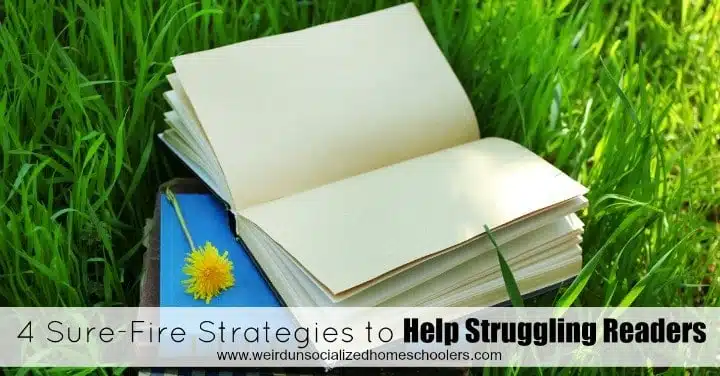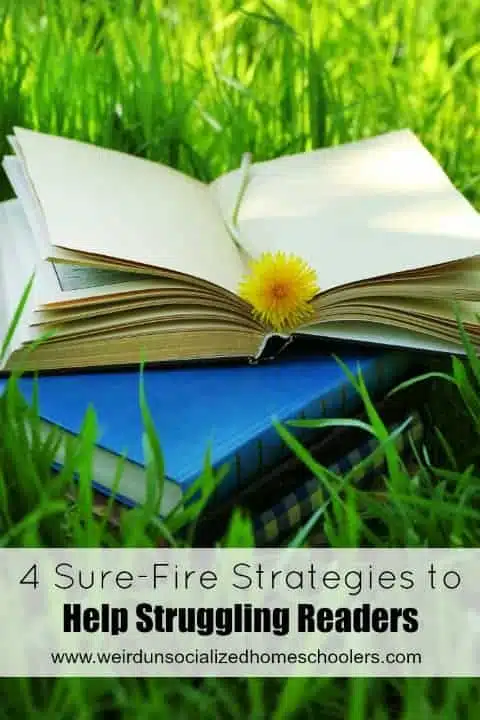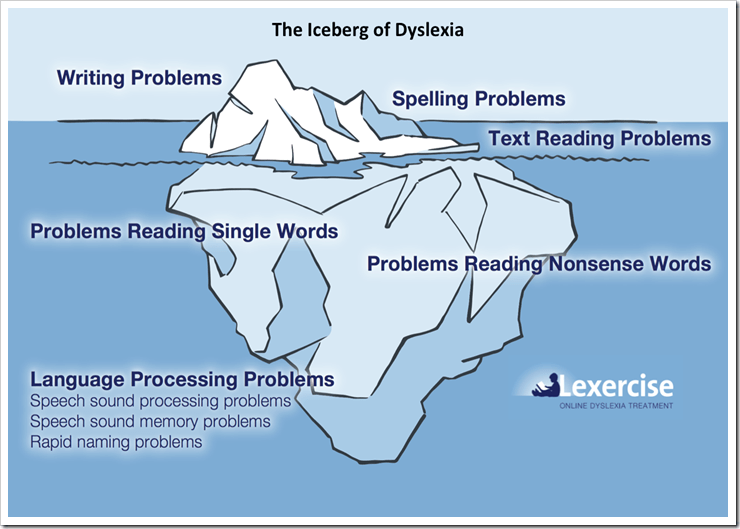4 Sure-Fire Strategies to Help Struggling Readers
Do you have a child who struggles with reading? It is such a maddening, helpless feeling to watch your child struggle and not know how to help. Suspecting that your child may have a learning disability magnifies that helpless feeling.
If you suspect that your child may have dyslexia, learn the warning signs, and develop a plan of action. Kids with dyslexia are not unintelligent; they just process information differently. While you can’t “cure” dyslexia, you and your child can learn how to deal with the processing differences it causes.

1. Get a diagnosis
The first step to helping your struggling reader is to determine if he does have dyslexia. Brianna has mom-diagnosed dyslexia. There is not a doubt in my mind that she is dyslexic. However, hers is mild enough that by educating myself and providing her with one-on-one attention, she learned to read and developed effective coping strategies.
Josh’s dyslexia is much more pronounced. The programs and techniques that worked with Brianna didn’t work with him. The turning point for us was getting a diagnosis. We used the free dyslexia screening offered by Lexercise. The screening indicated that Josh would benefit from a full evaluation.
(Because I know you’re wondering, no, it doesn’t flag every kid as needing the full assessment. Out of 10 bloggers and their children who tried the free screener as part of the review process, only two of us had children identified as potentially dyslexic.)
You may choose to seek an evaluator in your area. The earlier you seek treatment, the less your child has to struggle. I wish we had discovered Lexercise sooner. If you suspect your child may have dyslexia, I urge you to try the free screener. If nothing else, it may rule out the possibility and put your mind at ease.
2. Consider treatment options
We chose to complete the Lexercise dyslexia therapy, which was an answer to prayer for us. Because the cost of professional therapy proved prohibitive for many families, Lexercise now offers the option of basic therapy at a much lower rate. They also offer discounts for HSLDA members.
Although the initial cost of professional therapy may cause a bit of sticker shock, the investment was completely worth it. Josh completed the program in about five months, and some kids finish it in as little as three.
image used with permission from Lexercise, creator of a free online dyslexia test
There are, of course, other dyslexia treatment options, but Lexercise worked wonders for Josh, and I wholeheartedly recommend them. You may want to do some research on the Orton-Gillingham approach and the Barton method.
3. Educate yourself
Take the time to educate yourself. The more you learn about dyslexia, the more effectively you can help your child. I recommend:
- Overcoming Dyslexia by Sally Shaywitz, M.D.
- The Dyslexic Advantage by Brock L. Eide M.D. M.A. and Fernette F. Eide M.D.
- The Dyslexia Empowerment Plan by Ben Foss
I also highly recommend the site, Homeschooling with Dyslexia. Its author, Marianne Sunderland, is a 20+ year homeschooling veteran and mom of 8 kids, 7 of whom have dyslexia. Over the years, she has spent countless hours self-educating about dyslexia and is a certified Orton-Gillingham tutor.
Marianne has many resources, including Parent Dyslexia Classes, online courses to help you quickly and easily educate yourself about dyslexia and the most effective ways to help your dyslexic student.
These courses are for any parent of a dyslexic student regardless of whether your child is homeschooled or is attending public or private school.
4. Find the best resources
Finally, it’s important to find the best resources for your student. Dyslexia affects much more than just reading and spelling. You may need to think outside the box for other subjects, such as math and foreign language.
Both of my dyslexic students benefited from Teaching Textbooks, a video-based math curriculum. We also love All About Spelling, which works well for all types of learners, but was developed with dyslexic kids in mind.
I only wish All About Reading had been around when my kids were younger. We’d have used it in a heartbeat. The reading instruction meshes seamlessly with the spelling program.
Another fantastic resource is Learning Ally, a national non-profit organization that supplies audiobooks, read by volunteers, to people with visual and reading impairments. The books available include literature and textbooks (mostly titles used in public and private schools, but there are titles available from some of the more well-known homeschool publishers).
Many of their titles now include VOICEtext books, which highlights the words as they are read. That’s a fantastic help for kids with dyslexia who benefit from seeing and hearing the words.

Learning Ally does require a nominal yearly fee and a print disability diagnosis. (We used Josh’s diagnosis from Lexercise.)
We began using Learning Ally in 2014 and found it very helpful. Another option is checking out both the print book and the audiobook from the library, so your child can follow along visually as he listens.
These strategies proved extremely effective for my family of (formerly) struggling readers.
Have you had experience with a struggling reader? What tools or resources have you found particularly effective?
updated from an article originally published June 4, 2015
Kris Bales is a newly-retired homeschool mom and the quirky, Christ-following, painfully honest founder (and former owner) of Weird, Unsocialized Homeschoolers. She has a pretty serious addiction to sweet tea and Words with Friends. Kris and her husband of over 30 years are parents to three amazing homeschool grads. They share their home with three dogs, two cats, a ball python, a bearded dragon, and seven birds.






Just wondering, what did you do before you were a homeschool mom? Were you a school teacher? Were you already a stay at home mom when you decided to homeschool?
Yes, I was already a stay-at-home mom when we decided to homeschool. I left the workforce in late 1999.
My oldest daughter had a tough time learning to read. She isn’t dyslexic but she would read the complete wrong word! Not even the same beginning letter or anything. For her, it came down to readiness. When she was ready, the reading followed.
This is an excellent article on what parents can do, specifically homeschool parents! I think a lot of times people think kids need intervention from professionals when it comes to learning disabilities. But you have showed when there is a will there is a way!!